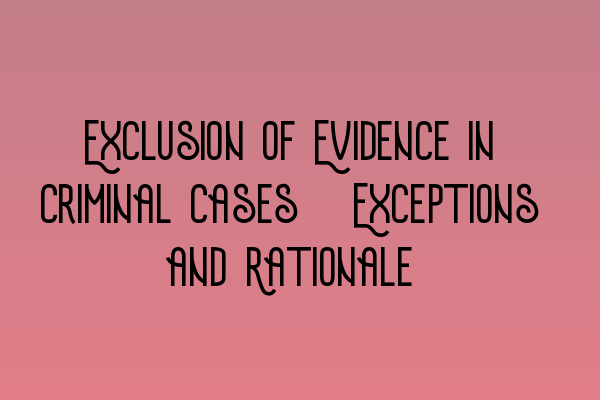Exclusion of Evidence in Criminal Cases: Exceptions and Rationale
Welcome to the SQE Criminal Law & Practice Law UK blog! In this article, we will be exploring the topic of exclusion of evidence in criminal cases. Understanding the exceptions and rationale behind this crucial legal concept is essential for aspiring solicitors preparing for the SQE Exam. Before we dive into the details, we recommend checking out these related articles to enhance your knowledge:
- SQE Exam Prep: Essential Study Materials for Aspiring Solicitors
- Demystifying the Solicitors Qualifying Examination Format
- SQE Exam for International Lawyers: Challenges and Success Strategies
- LLC Formation Made Simple: Step-by-Step Guide for UK Entrepreneurs
- LLC Formation: A Step-by-Step Guide for UK Entrepreneurs
Understanding the Exclusion of Evidence
In criminal cases, the exclusion of evidence refers to the legal principle that allows the court to exclude certain pieces of evidence from being presented during trial. This exclusion can occur for various reasons, including violations of the defendant’s rights, unreliable or unlawfully obtained evidence, or evidence that could unduly prejudice the jury.
Now, let’s explore the exceptions to the exclusion of evidence and understand the rationale behind them.
Exceptions to the Exclusion of Evidence
1. Admissibility in the Interests of Justice
One of the exceptions to the exclusion of evidence is when the court determines that admitting the evidence is necessary in the interests of justice. This exception allows the court to consider the probative value of the evidence and weigh it against any potential prejudice it may cause. It ensures that relevant evidence is not unfairly excluded, especially in circumstances where the evidence is highly significant.
2. Public Interest Immunity
In certain cases, the court may exclude evidence on the grounds of public interest immunity. This exception aims to protect sensitive or confidential information from being disclosed during trial, particularly when it could jeopardize national security, endanger individuals, or harm ongoing investigations. Although this exception restricts the availability of evidence, it is crucial for upholding the broader public interest.
3. Illegally Obtained Evidence
Another important exception to the exclusion of evidence is the consideration of illegally obtained evidence. Whilst evidence obtained in violation of the defendant’s rights may be excluded, there are circumstances where the court may exercise discretion and allow the evidence to be admitted. This discretion is typically exercised when the court deems the evidence to be vital and the breach of rights to be relatively minor. The fundamental principle is to strike a balance between deterring unlawful conduct by law enforcement agencies and ensuring a fair trial.
Rationale Behind the Exclusion of Evidence
The exclusion of evidence serves multiple purposes within the criminal justice system:
1. Protecting Constitutional Rights
By excluding evidence obtained through constitutional violations, the court upholds and protects the defendant’s constitutional rights. These rights include the right to a fair trial, protection against unreasonable searches and seizures, and protection against self-incrimination. The exclusionary rule acts as a deterrent, discouraging law enforcement agencies from engaging in unlawful or unconstitutional practices.
2. Ensuring Reliability
The exclusion of unreliable evidence ensures the integrity and reliability of the criminal justice system. Evidence that is tainted, fabricated, or lacks credibility can lead to wrongful convictions, undermining public trust in the justice system. By excluding such evidence, the court maintains the integrity of the trial process and promotes a fair and accurate determination of guilt or innocence.
3. Preserving Judicial Integrity
The exclusionary rule preserves the integrity and reputation of the judiciary. It reinforces the notion that judges should not condone or participate in illegal and unconstitutional actions. By excluding evidence obtained unlawfully, the court sends a clear message that it will not tolerate evidence gathering methods that violate fundamental rights and principles.
Conclusion
The exclusion of evidence in criminal cases is a vital component of the legal system, ensuring fairness, reliability, and the protection of constitutional rights. By understanding the exceptions and rationale behind this principle, aspiring solicitors can develop a comprehensive knowledge base to tackle the SQE Exam and excel in their legal careers.
We hope you found this article informative and insightful. For further resources on SQE Exam preparation and other relevant legal topics, be sure to check out the related articles above. Thank you for reading!
